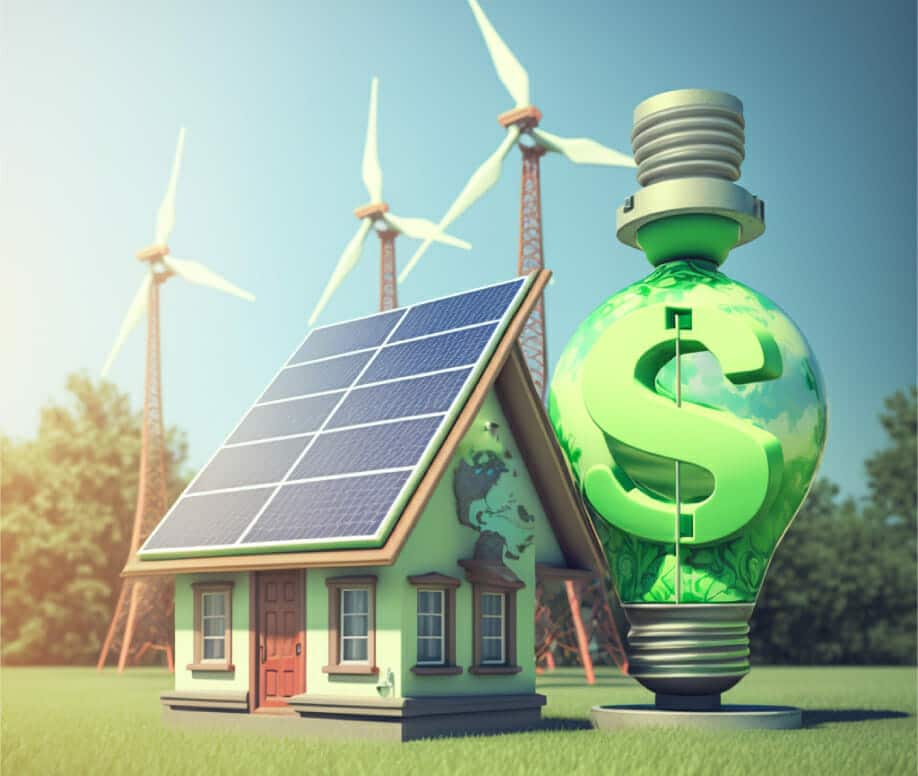The IRS recently released a fact sheet regarding two beneficial tax incentives for eco-conscious homeowners. If you’ve been thinking of making energy upgrades to your home, these incentives can help offset the costs. As our country continues to push forward in the green energy movement, the government is working to encourage taxpayers to make positive changes. As a homeowner, it’s important to be aware of all the tax incentives you could take advantage of. Don’t leave free money on the table!

Available Credits
The Energy Efficient Home Improvement Credit (IRC § 25C) and the Residential Clean Energy Property Credit (IRC § 25D) are nonrefundable personal tax credits available to taxpayers who invest in green energy improvements for their homes. While both are designed to incentivize sustainable energy usage, they differ in their exact details and applicability.
Energy Efficient Home Improvement Credit
The Energy Efficient Home Improvement Credit aims to reward taxpayers who make upgrades to reduce the overall energy consumption of their homes. It is an annual credit typically worth up to $1,200 and can be applied to properties placed in service on or after January 1, 2023 and before January 1, 2033.
The credit is intended to subsidize three main expense types:
- Energy efficient home improvements
- Installation of qualified energy property
- Home energy audits
Residential Clean Energy Property Credit
Taxpayers who qualify for the Residential Clean Energy Property Credit can receive a nonrefundable tax credit equal to 30% of renewable energy expenditures. The credit applies to properties placed in service after December 31, 2021 and before January 1, 2033.
Eligible expenditures include those made toward:
- Battery storage technology
- Solar power
- Wind energy
- Geothermal heating
- Fuel cells
Qualifying Properties
If you’ve made efforts to improve the energy efficiency of your home or generate clean energy, there’s a good chance you’re eligible for either the Energy Efficient Home Improvement Credit or the Residential Clean Energy Property Credit. However, you should first ensure your property meets all requirements.
As a general rule, the taxpayer must reside in the home for it to qualify for the incentive. Some credits may be available for second homes, but only for certain improvements.
Energy Efficient Home Improvement Credit
The Energy Efficient Home Improvement Credit applies to existing homes, home additions and home renovations. Newly constructed homes are not eligible.
The credit’s energy efficiency requirements vary by expenditure type. These requirements include:
- Exterior Doors: Exterior doors must meet all applicable Energy Star requirements.
- Windows / Skylights: Windows and skylights must have obtained the Energy Star Most Efficient certification.
- Insulation: Insulation materials and air sealing systems must meet applicable International Energy Conservation Code (IECC) standards.
- HVAC / Water Heaters: Eligible systems include electric heat pumps, natural gas heat pumps, heat pump water heaters, central air conditioners, natural gas water heaters, propane water heaters, oil water heaters, natural gas furnaces, propane furnaces, oil furnaces and hot water boilers. All equipment must achieve the highest Consortium for Energy Efficiency (CEE) efficiency tier that is in effect the year the property is placed in service.
- Oil Furnaces / Hot Water Boilers: Oil furnaces and hot water boilers can also qualify if they meet 2021 Energy Star efficiency criteria and are rated for use with fuel blends consisting of at least 20% eligible fuel.
- Biomass Stoves / Biomass Boilers: Biomass stoves and boilers must have a thermal efficiency rating of at least 75%.
- Panelboards / Branch Circuits: Panelboards, sub-panelboards, branch circuits and feeders must meet National Electrical Code (NEC) standards and have a load capacity of at least 200 amps.
Residential Clean Energy Property Credit
Both existing homes and newly constructed homes are eligible for the Residential Clean Energy Property Credit. General requirements include:
- Solar Water Heating: The property must be certified by the Solar Rating Certification Corporation or a comparable entity.
- Geothermal Heat Pumps: The heat pump must meet all Energy Star standards in effect at the time the expenditures are made.
- Battery Storage Technology: The battery must have a capacity of at least three kilowatt-hours.
Credit Amounts
The value of these tax credits depends on a variety of factors, including the specific types of improvements made to a residence. Outlined below is a basic guide for calculating credit amounts.
Energy Efficient Home Improvement Credit
The maximum total yearly value of the Energy Efficient Home Improvement Credit is $3,200. There is an aggregate limit of $1,200 for all building envelope components, home energy audits and energy properties. Additionally, electric or natural gas heat pumps, electric or natural gas heat pump water heaters, biomass stoves and biomass boilers have an aggregate limit of $2,000.
The credit amount is calculated based on individual building components:
- Exterior doors: 30% of costs up to $250 per door for a maximum total of $500
- Windows and skylights: 30% of costs up to $600
- Insulation: 30% of costs
- Home energy audits: 30% of costs up to $150
- HVAC and water heaters: 30% of costs (including labor) up to $600 per item
- Panelboards and sub-panelboards: 30% of costs (including labor)
- Branch circuits and feeders: 30% of costs (including labor)
- Heat pumps: 30% of costs (including labor)
- Biomass stoves and boilers: 30% of costs (including labor)
Residential Clean Energy Property Credit
Unlike the Energy Efficient Home Improvement Credit, the Residential Clean Energy Property Credit does not have an overall dollar limit. It is worth 30% of the costs of:
- Solar panels
- Solar water heaters
- Fuel cells (up to $500 per half kilowatt of storage capacity)
- Wind turbines
- Geothermal heat pumps
- Battery storage technology
Conclusion
The Energy Efficient Home Improvement Credit and Residential Clean Energy Property Credit provide excellent opportunities for homeowners looking to save on taxes. If you plan to upgrade your home’s energy efficiency or install clean energy technology in the coming year, you may be eligible for a direct tax credit.
The easiest way to find out if your home meets the requirements for either of these tax incentives is by speaking with an experienced tax professional. Someone who has studied tax law extensively and who has a solid background in the industry will best be able to advise you on your options.



